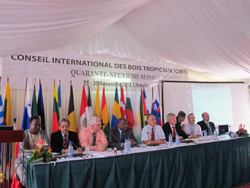Legal timber, shifting crisis into opportunity
29 November 2013

Panelist of the 2013 ITTO Annual Market Discussion shared experiences on trade approaches to meeting demands for legality". Photo: R. Carrillo/ITTO
The theme of the 2013 Market Discussion was proposed by the TAG to provide an opportunity for sharing experience on the development of timber legality verification, of Forest Governance Law Enforcement and Trade (FLEGT) Voluntary Partnership Agreements (VPAs) with the European Union (EU) on the impact of the EU timber regulation (EUTR) on the structure of the timber sector in importing countries and the impact of the new regulations on tropical timber trade flows.
Illegal logging and the associated trade in illegally sourced wood products undermine environmental, economic and social structures and have heightened concern on over-exploitation and poor forest management. A number of initiatives have been taken by consumer and producer countries to address the issue: they include public policy and regulatory measures tackling both the demand and the supply side, and private certification schemes. However, legislative initiatives such as the EUTR and similar measures taking by other consumer could have unintended direct and indirect effects that could result in changes in trade flows.
During the Market Discussion many countries, such as Cote d’Ivoire, Ghana, Honduras, and Indonesia expressed a common view of seeing the VPAs established under the EU FLEGT Action Plan as a tool to create an environment that promotes trade in legal timber products and sustainable forest management with wider stakeholder participation, better governance, improved livelihoods and benefits to the forest sector in general, while at the same time securing access to the European timber market.
Speakers also drew attention to declining imports of tropical timber in the EU. They noted that this decline was due to a broad range of factors including weak economic growth, irregularity of supply, high cost of infra-structure for stocking and distributing timber, shifting of demand from utility timbers to engineered products, substitution by temperate hardwoods and other materials, and increasing focus on other markets. Speakers felt that it was generally too early to be able to assess any impacts of the EUTR on timber trade.
One of the main conclusions of the Market Discussion was the compelling need for producers, importers and international organizations such as ITTO to turn crisis into opportunity by changing the narrative in the marketplace to eliminate prejudices against tropical timber from natural forests. This could be achieved through proactive marketing campaigns that effectively communicate the advances made by the public and private sector to address consumer concerns on deforestation and illegal logging. Such efforts may imply putting aside competition issues and working together to achieve this common goal.
The EU expressed its commitment to closely monitoring trade flows when FLEGT-licensed timber becomes available and to work with ITTO on this matter.